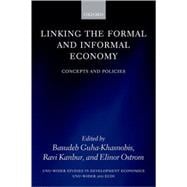
Linking the Formal and Informal Economy Concepts and Policies
by Guha-Khasnobis, Basudeb; Kanbur, Ravi; Ostrom, ElinorBuy New
Rent Textbook
Rent Digital
Used Textbook
We're Sorry
Sold Out
How Marketplace Works:
- This item is offered by an independent seller and not shipped from our warehouse
- Item details like edition and cover design may differ from our description; see seller's comments before ordering.
- Sellers much confirm and ship within two business days; otherwise, the order will be cancelled and refunded.
- Marketplace purchases cannot be returned to eCampus.com. Contact the seller directly for inquiries; if no response within two days, contact customer service.
- Additional shipping costs apply to Marketplace purchases. Review shipping costs at checkout.
Summary
Author Biography
Basudeb Guha-Khasnobis is a Senior Research Fellow at UNU-WIDER. He is a PhD from the University of Rochester and worked for IGIDR (Mumbai), ICRIER (New Delhi) and The Exim Bank of India. His research interests include international economics, development economics and financial economics. Ravi Kanbur is T.H. Lee Professor of World Affairs, International Professor of Applied Economics and Management, and Professor of Economics at Cornell University, and previously Professor of Economics at the University of Warwick, and Chief Economist for Africa at the World Bank. Elinor Ostrom is Arthur F. Bentley Professor of Political Science at Indiana University. She is also Co-Director, Workshop in Political Theory and Policy Analysis and Co-Director, Center for the Study of Institutions, Population and Environmental Change (CIPEC) at Indiana University. She is a member of the Expert Group on Development Issues of the Swedish Ministry for Foreign Affairs.
Table of Contents
An electronic version of this book is available through VitalSource.
This book is viewable on PC, Mac, iPhone, iPad, iPod Touch, and most smartphones.
By purchasing, you will be able to view this book online, as well as download it, for the chosen number of days.
Digital License
You are licensing a digital product for a set duration. Durations are set forth in the product description, with "Lifetime" typically meaning five (5) years of online access and permanent download to a supported device. All licenses are non-transferable.
More details can be found here.
A downloadable version of this book is available through the eCampus Reader or compatible Adobe readers.
Applications are available on iOS, Android, PC, Mac, and Windows Mobile platforms.
Please view the compatibility matrix prior to purchase.
